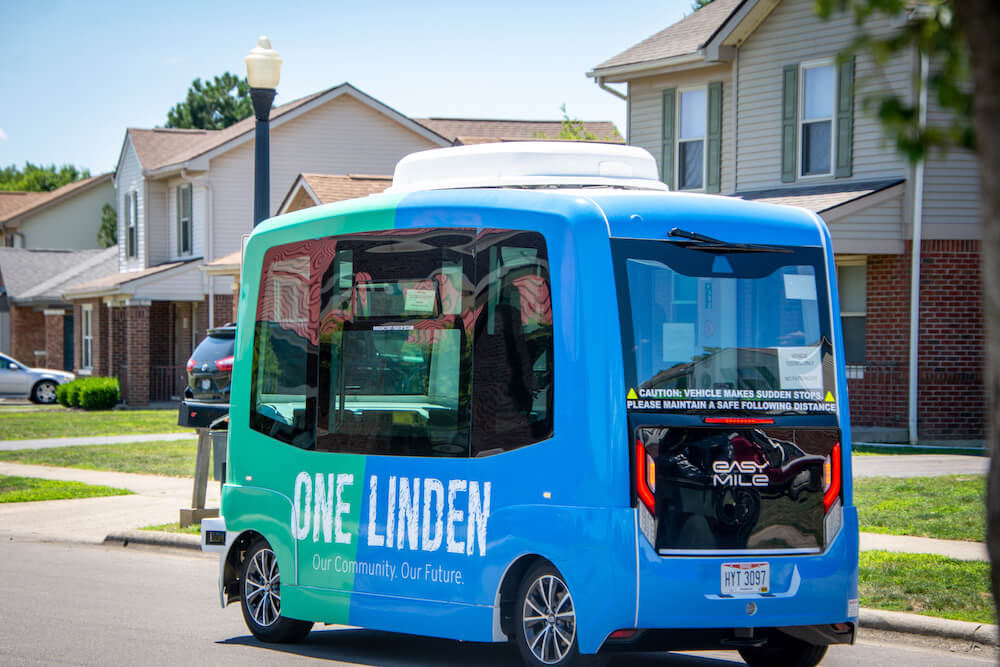 Because of the coronavirus pandemic, plans for the Linden LEAP autonomous shuttle have changed from transporting people to transporting free food boxes to a local community in need.
Because of the coronavirus pandemic, plans for the Linden LEAP autonomous shuttle have changed from transporting people to transporting free food boxes to a local community in need.
The Linden LEAP began operations in Columbus, Ohio, in February, but a minor incident involving a passenger a few weeks into deployment led to a temporary halt in U.S. operations for all EZ10 autonomous shuttles. In May, The National Highway Traffic Safety Administration (NHTSA) gave the go-ahead to resume operations in the U.S. once specific safety measures were put into place and coronavirus-related restrictions eased.
But coronavirus restrictions show no sign of easing any time soon, so the team at Smart Columbus decided to change plans and begin transporting food instead of people. The autonomous shuttle is now taking pre-packaged food boxes from St. Stephen’s Food and Nutrition Center to the Rosewind Community Center, where residents can meet the shuttle to pick up the boxes as well as face masks Monday through Friday. A trained operator rides on board the shuttle to ensure safety and then helps distribute the boxes once at the community center.
“With the pandemic, like many projects, we hand to pivot and look at what problems we can solve using the same technology and route,” said Mandy Bishop, Smart Columbus program manager, City of Columbus. “We always hope to return to serving people and moving people but we are 100 percent following the mayor’s and governor’s leadership. We’ll continue to watch the pandemic and how the guidelines evolve.”
This new service is meeting a great need for the community center while also allowing the Smart Columbus team to learn more about the technology and how it might be used in the future.
“We have seen an unprecedented need for food during the current pandemic. About 20 percent of those in need do not have transportation to our center and the nearest bus stop is ½ to 3/4 of a mile away,” St. Stephen’s Community House CEO Marilyn Mehaffie said, according to a news release about the relaunched project. “The Linden LEAP will help bridge the transportation gap, providing food at Rosewind.”
Smart Columbus also recently announced the addition of Smart Mobility Hubs to help alleviate first mile/last mile challenges for residents who ride the city’s rapid transit line. Multimodal solutions are available at accessible locations throughout the community, Bishop said. Mobility options include different combinations of conventional and e-bikes, scooter parking and charging docks, EV charging, ride-hail pick/up drop off points, and also dockless scooter, bike, and car share parking.
Smart Columbus is looking for volunteers who are interested in having connected vehicle technology installed into their cars. The equipment will provide real-time safety alerts to help drivers make more informed decisions.
The board units have been installed on city buses and public service vehicles, including police and fire, Bishop said, and provide warnings when there’s danger of a collision as well as other safety alerts. The team plans to start gathering information from citizen vehicles beginning in October.
“We’re looking to learn how people use information to make decisions about driving habits, how they like to interact with it and how it informs them throughout the demonstration,” Bishop said. “Long term, we’re hoping that information will help us make decisions about where equipment could be most beneficial and how to deploy it city and region wide.”
These pilots will run through March 2021. Reporting will be provided to the USDOT and published via the Smart Columbus website in May 2021.
Repurposed: the Self-Driving Linden LEAP Shuttle
previous post

